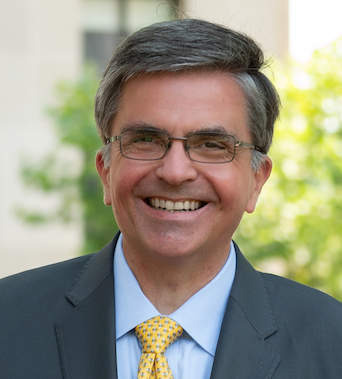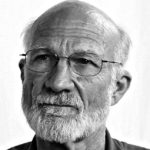Longtime Presbyterian “womanist” theologian Delores Williams of Union Seminary recently died. (“Womanist” is a black feminist theologian.) She lived a full and fascinating life in which she followed her convictions. May she rest in peace.
Her name is tied to the highly controversial ecumenical “Re-Imagining Conference” of 1993 at which Williams derided the Christian doctrine of Christ’s atoning for the world’s sins by His sacrifice on the cross:
“I don’t think we need a theory of atonement at all … I don’t think we need folks hanging on crosses and blood dripping and weird stuff.”
Many in the crowd of over two thousand church women applauded. Williams’s comment was only one of many by radical feminist theologians at this event hosted by the official women’s agencies of Mainline Protestant denominations, especially the Presbyterian Church (USA) and the United Methodist Church, as part of the World Council of Churches’ “Decade of Solidarity with Women.” Its purpose was to replace supposedly patriarchal traditional Christianity with a liberating new faith of pantheistic feminine deities. There were many controversial quotes:
- Social justice activist Melanie Morrison: “I’m pleased and honored to lead you in prayer and to talk to earth maker Mauna, our creator.”
- Episcopal Divinity School professor Kwok Pui Lan: “We cannot have one savior — just like the Big Mac in McDonalds, prepackaged, shipped all over the world. It won’t do. It’s imperialistic.” She offered China’s 722 gods and goddesses as an example of “radical inclusivity.”
- South Korean Presbyterian theologian Chung Hyun Kyung, extolling indigenous Asia spirituality and cosmic energy: “This life-giving energy came from god [sic] and it is everywhere. It is in the sun and in the ocean; it is from the ground and it is from the trees.”
- Virginia Mollenkott of William Patterson University: “We would understand Jesus to be our elder brother, the trailblazer and constant companion for us who are here in time and space, but ultimately one among many brothers and sisters in an eternally, equally worthy siblinghood.”
- Aruna Gnanadason of the World Council of Churches: [The church] “centered its faith around the cruel and violent death of Christ on the cross, sanctioning violence against the powerless in society.”
- Lutheran minister Barbara Lundblad boasted amid laughter and cheers: “We did not last night name the name of Jesus. Nor have we done anything in the name of the Father and of the Son and of the Holy Spirit”
Worshippers at Re-Imagining chanted and prayed to “Sophia” as the divine feminine personification of wisdom: “Our maker Sophia, we are women in your image; with the hot blood of our wombs we give form to new life. With nectar between our thighs we invite a lover, with our warm body fluids we remind the world of its pleasures and sensations.”
The Re-Imagining Conference was recorded, and as the audio became widely available, the controversy spread. The New York Times, Los Angeles Times, and other major media, including Ted Koppel’s “Nightline” on ABC, reported on its most incendiary aspects. Denominational and ecumenical officials who funded, hosted, and attended the event distanced themselves from it while not expressing regret. Most official church agencies did not endorse subsequent Re-Imagining reunions, which ended after a decade, unable to generate the controversy and excitement of the early days.
Re-Imagining’s retreat was accompanied by an overall decline in interest in radical feminist theology even in liberal Protestant communities. Redefining God as feminine became less important than church affirmation of non-traditional sexuality and transcending gender. Re-Imagining did include strong spiritual affirmation of lesbianism, but radical feminist theology stressed deconstructing patriarchy over sexual liberation.
Even as Re-Imagining faded, Williams stuck with her preferred womanist themes, especially rejection of Christ’s atonement. In 1993, the same year as Re-Imagining, she published Sisters in the Wilderness: The Challenge of Womanist God-Talk, which, as Christian Century describes, “compares the plight of Black women in the United States to that of Hagar in the Bible—forced surrogates, alone in the wilderness, able to rely only on God.” From this comparison Williams deduced that “a God who saves via suffering cannot be a true savior for Black women.” She minimized Jesus on the cross and preferred to highlight His work for justice.
Recalling this emphasis, one of Williams’s seminary colleagues, Episcopal priest Kelly Brown Douglas, who’s dean of Union Seminary’s Episcopal studies, eulogized her:
Delores Williams was a pioneer of womanist thought who shifted the paradigm of how we think about the cross. With boldness and courageousness, she claimed her voice even as many in the church rejected her claim that there is no “power in the blood.”
Williams explained her rejection of Christ’s blood when asked at Re-Imagining in 1993: “What is our theory of atonement to be? For what did Jesus come?” She answered:
I don’t think we need a theory of atonement at all. I think Jesus came for life and (to show us) how to live together, what life was all about.” Recalling a visit to a Catholic, she noted disapprovingly: “No images of ministry, of the mustard seed, fishes and loaves. I don’t think we need folks hanging on crosses, and blood dripping, and weird stuff. We need the sustenance, the faith, the candles to light. Jesus’ mandate is that we pass on tough love, love that’s whipping the thieves out of the temple. I don’t see that the cross does that. I think the cross ought to be interpreted for what it was, a symbol of evil, the murder of an innocent man and victim. When we confront the status quo as Jesus did, when we raise questions about the poor and empowering people who’ve never had power before, we’re more than likely going to die for it.
Williams at Re-Imagining claimed the incarnation was not God becoming man in Jesus but in the Spirit’s visiting Mary. “We have a whole different notion of incarnation,” she said. “The Spirit [rather than Jesus] tells us who God is.” Feminist theology portrayed the atonement through Jesus on the cross as divine child abuse, not accepting that Jesus was Himself fully divine and submitting to the sacrifice willingly. Williams, who participated in the Civil Rights Movement, wanted to overthrow generations of oppression of black women. As Presbyterian News Service noted in its obituary, “Williams pushed back against the centrality that the cross played in Black liberation theology and the impact that justifying violence had on Black women’s lives.”
Christianity historically understands Christ’s sufferings as both an atonement for humanity’s sins and solidarity with our suffering. The imagery of Christ on the cross has been especially important to generations in black American Christianity, dating back to the earliest days of slavery. Sadly, Williams did not fully understand the power and the solace of a suffering Christ, who shed His blood so that all might live.
Williams thought Christ’s atonement was distracting “weird stuff.” But millions of Christians in all cultures and times, unencumbered by an education at Union Seminary in New York, intuitively understand there is great power in His blood.






Comment by George on December 9, 2022 at 6:23 pm
You just can’t make this stuff up. There’s no wonder the nation is divided. The church is divided. Families are divided. It’s bewildering. I can say no more.
Comment by Gordon Hackman on December 10, 2022 at 2:15 pm
It’s both strange and sad to me that so many liberal theologians like Williams can’t see how Jesus death on the cross is both the murder of an innocent victim and the triumph of God over sin and evil. That’s the beauty of it; what appeared on the surface to be the triumph of evil was actually it’s defeat. That is the foolishness of God which is wiser than the wisdom of man. Liberal theology settles for the wisdom of man, and ends up being both heretical and boring.
Comment by David Mu on December 11, 2022 at 9:54 am
Feminism in the church was/is merely the icing on the cake that defines the modern church as your go to place for mental castration. And increasingly men make the correct choice to go for the quick option of the garbage disposal instead of the slower job done when a man steps inside a modern church.
And the roots of it go far back past this collection of witch feminism.
Comment by Star Tripper on December 11, 2022 at 11:43 am
That first paragraph was cringe beyond belief. I can see Mark on April 30, 1945: Today Adolph Hitler the leader of Nazi Germany died by his own hand. He lived a full and fascinating life in which he followed his convictions. May he rest in peace. Get a grip, Mark, Williams was a heretic who preached falsehood and led many astray.
Comment by JoeR on December 12, 2022 at 5:47 am
As was said frequently as I was growing up “that person is educated beyond their ability to comprehend.”
Comment by Stephanie Jenkins on December 12, 2022 at 9:07 am
good grief. Wonder what happened to her to make her so crazy.
Comment by Sigma on December 12, 2022 at 10:23 am
Cold War Theologies are interesting, to say the least. 😊
As a Christian black woman (who has not even heard the above-named person until this post), while I disagree with her stance on the atonement theory, I can understand what she is talking about…and a 10-minute search on Youtube has videos of her explaining her position. She is reacting to the horrors of WWII and segregation/Jim Crow… her stance is just a variation that is not much different than other liberation theologies and the Death of God movement. Ironically, if you look at the violence that is done in the name of God (or, ironically, some of the iconography that we have in our nation of weaponized Christianity), you can see her point. Her theology condemns the prior theologies that nearly ended up destroying civilization as we know it and yes, that will cause controversy.
The question is, how do we handle that critique? Do we denounce it because it is heretical or do we dig below the surface and try to understand what the accusation is actually about? Do we reflect upon the spiritual state of the church and consider that we do need a true reformation, that we have lost our way to let the name of Christianity becomes so marred or do we double down and cast them all out without a deep inquiry into the matter? Are we not then behaving as badly as the Catholic church did 500 years ago?
Do not mistake this as a call for tolerance or heterodox or unorthodox beliefs within the church. What I am saying is that Protestantism seems to be prone to corruption. What was a novel attempt by the Reformers has degraded into vying political factions that do not, for the most part, display the fruit of the Holy Spirit. Until the church cleans up its own house, then we shouldn’t be surprised that more controversial theologies will continue to be created. We have long passed the tipping point of the church being in a maelstrom of a spiritual and political crisis, and yet, there seems to be no realization that maybe we have had a hand in our own demise. Theologies like these are symptoms of a bigger malignancy WITHIN the church and it goes beyond not having Biblical teachings (although that is a part of it).
Comment by Slalom5 on December 12, 2022 at 11:22 pm
Sigma
Please go on to further explain her comradery and support of others that deny Christ’s atonement, the pantheon of god’s they encourage us to pray to, and the denial of Christ’s divinity. I’ll wait.